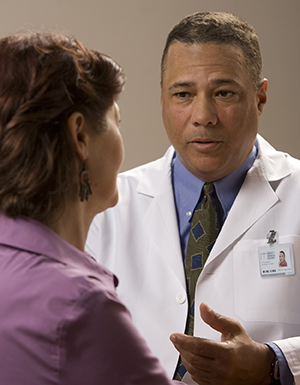After Treatment for a Mouth or Throat Tumor
After Treatment for a Mouth or Throat Tumor

Treatment for a tumor may change the way you speak, chew, or eat. If so, your healthcare team will show you new ways to do these important tasks. Family, friends, and other people you trust can also help you adjust.
Help with daily tasks
Surgery to remove a tumor may make simple tasks harder to do for a while. If needed, your therapists can help you relearn how to chew or swallow food. If you have a stoma or a feeding tube, your healthcare team will show you how to care for it. If you have dentures, you may need to get new ones. And you may need to practice moving muscles in your neck or face. Members of your healthcare team can help. If you need help at home, ask them about home nurses and health aides.
Help with speaking
If you have your larynx removed, it will change the way you speak. But you can learn to speak again. A speech pathologist can help you use one or more of the following:
-
Electrolarnyx. This is a device like a microphone that you hold up to your throat when you want to talk.
-
Esophageal speech. This creates speech using air forced up from your esophagus.
-
Voice prosthesis. This is a special valve placed inside your throat to help you speak. The procedure to place the valve is called a tracheoesophageal puncture (TEP).
Help with emotional health
You are likely to have strong feelings about your cancer, both during and after treatment. You may feel fear, anxiety, and depression. Your loved ones may feel these same emotions. You can help manage these feelings by having the support of friends and other family members. Talk about your concerns with your healthcare team.
Strong emotions are common for anyone coping with cancer. But call your healthcare provider right away if you have any of the following symptoms:
-
Thoughts of suicide
-
Can't sleep or don't feel like eating
-
Confusion
-
Lack of interest in all activities or can't find pleasure in things you used to enjoy
-
Restlessness
-
Can't do your daily activities because you feel distressed
-
New or unusual behaviors or emotions that concern you
Following up
In the future, you may need more exams, X-rays, tests, or treatment. Be sure to follow up with your healthcare team as directed. It’s also important to do what you can to improve your health.
Updated:
March 15, 2019
Reviewed By:
Ashutosh Kacker MD